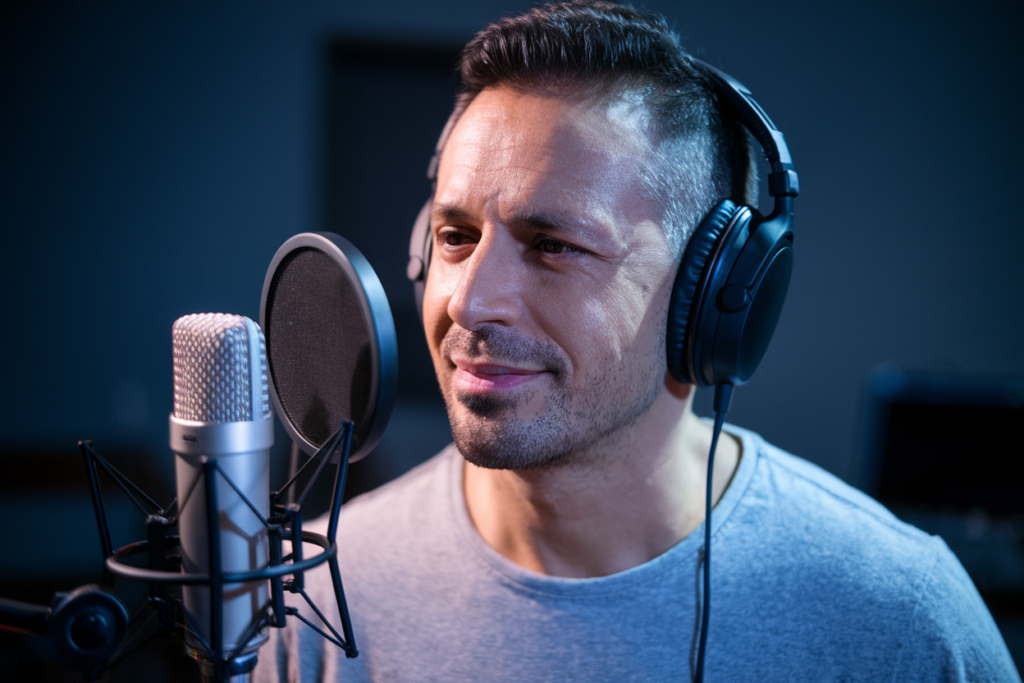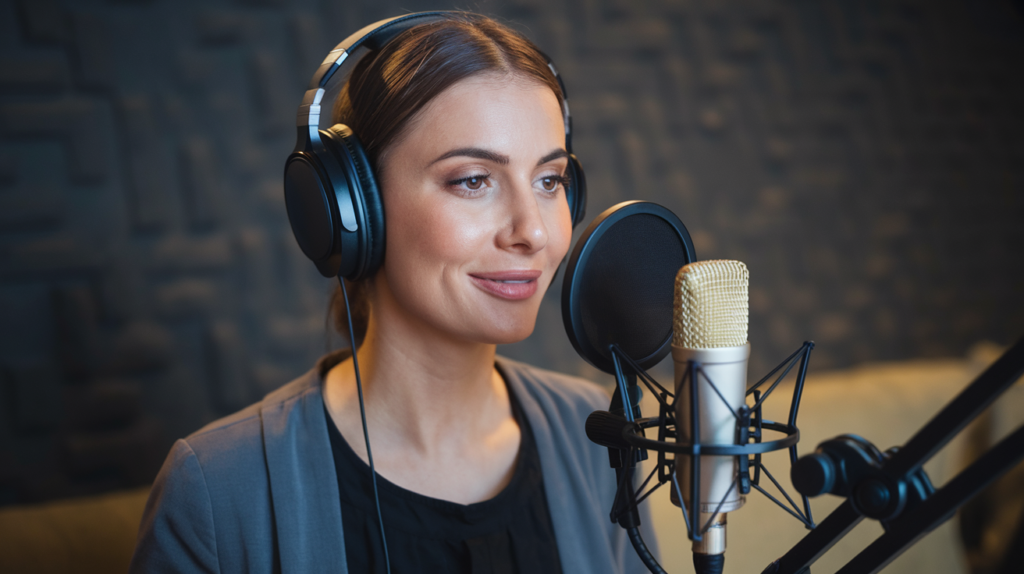Key Takeaways
- Understanding Turkish Nuances: Familiarity with language nuances, including regional dialects and cultural references, is essential for authentic voice acting in Turkish media.
- Key Skills for Voice Actors: Mastering voice modulation techniques and character interpretation enhances the performances of Turkish voice actors, making them more engaging and relatable.
- Importance of Script Analysis: Thorough script analysis allows voice actors to understand key themes and character dynamics, leading to intentional and genuine portrayals during recordings.
- Creating a Professional Voice Profile: Developing a well-crafted voice profile showcases unique vocal qualities and versatility, attracting potential clients in various media niches.
- Effective Recording Techniques: A proper home studio setup and professional recording strategies are crucial for achieving high-quality sound that captures the essence of the intended message.
- Collaboration in Studio Settings: Clear communication with directors and engineers during recording sessions fosters collaboration, ultimately resulting in better overall performance outcomes.
Ever wondered how to guide Turkish voice actors to deliver their best performances? Whether you’re a director, producer, or even an aspiring voice coach, understanding the nuances of this vibrant talent pool can make all the difference.
Understanding Turkish Voice Acting
Turkish voice acting showcases unique talents that bring stories to life. Knowing how to guide these voice actors enhances the overall production quality in various media.
The Role of Voice Actors in Turkish Media
Voice actors play a crucial role in Turkish media, contributing significantly to animation, dubbing, and commercials. They embody characters’ emotions and convey messages effectively. A skilled voice artist knows how to adjust their tone, pacing, and inflection based on the specific context of a project. This versatility makes them invaluable for creating engaging content that resonates with audiences.
Importance of Language Nuances
Understanding language nuances is vital when working with Turkish voice talent. The richness of the Turkish language includes regional dialects and cultural references that can influence delivery. A proficient voice over actor navigates these subtleties skillfully, ensuring authenticity in performance. Recognizing idiomatic expressions and local slang adds depth to character portrayals and strengthens audience connection.
By appreciating the roles and nuances involved in Turkish voice acting, you can help your chosen talent deliver outstanding performances that elevate your projects.
Essential Skills for Turkish Voice Actors
Turkish voice actors bring unique qualities to their performances, making it essential to master specific skills. Here are some key areas to focus on.
Voice Modulation Techniques
Voice modulation plays a vital role in delivering engaging voiceovers. You’ll want to experiment with pitch, tone, and volume to match the emotions of the character or message. Adjusting your delivery based on context enhances authenticity. For instance, a dramatic scene may require deeper tones and slower pacing, while comedic moments often benefit from lighter, quicker deliveries. Practicing different modulation techniques can help you connect better with audiences.
Character Interpretation
Character interpretation is crucial for any voice artist looking to make an impact. Understanding a character’s background, motivations, and personality traits allows you to embody them fully during recordings. Dive into scripts and analyze what makes each character tick—consider their emotions and relationships with others. This understanding leads to more genuine performances that resonate with listeners. Don’t hesitate to explore various interpretations; flexibility in your approach can reveal new dimensions of the characters you portray.
By honing these essential skills, Turkish voice actors elevate their craft and contribute significantly to the richness of projects across media platforms.
Preparing for Voice Acting Roles
Preparing effectively for voice acting roles is crucial for achieving outstanding performances. Understanding the script and character dynamics sets the foundation for a successful recording session.
Script Analysis
Script analysis involves breaking down the material to grasp its nuances fully. Start by identifying key themes, emotions, and character arcs within the script. Ask yourself questions like: What are the character’s motivations? How do they evolve throughout the story? Highlight important lines that convey significant emotional shifts or pivotal moments in the narrative. This careful examination allows you to approach your performance with intention, ensuring you embody your character authentically.
Additionally, pay attention to pacing and rhythm in dialogue delivery. Notice how sentence structure affects timing; short sentences may require quick bursts of energy, while longer passages might call for a more measured approach. By analyzing these elements, you’ll adapt your voiceover techniques accordingly and create a compelling audio experience.
Creating a Voice Profile
Creating a voice profile helps showcase your unique qualities as a voice talent. Begin by assessing your vocal range—know what works best for you in terms of pitch, tone, and style. Record samples that highlight different aspects of your voice; this can include various accents or characterizations that reflect versatility.
Consider developing specific genres or niches where you excel—be it animation characters or commercial reads. Tailoring samples around these areas will attract potential clients seeking particular styles of voiceover work.
Lastly, ensure your recordings reflect professionalism—clear sound quality and engaging delivery make all the difference when presenting yourself as a viable choice among voice artists. A well-crafted voice profile not only demonstrates skill but also builds confidence when auditioning for diverse projects across media platforms.
Techniques for Effective Voice Recording
Effective voice recording techniques play a crucial role in enhancing the quality of your projects. By implementing these strategies, you can ensure that every recording captures the essence of your message.
Home Studio Setup
A well-equipped home studio is essential for achieving professional-level recordings. Start with soundproofing your space; consider using acoustic panels or thick curtains to minimize background noise. Invest in a high-quality microphone tailored for voiceovers, as it impacts clarity and richness. Additionally, selecting an audio interface enhances sound capture by converting analog signals into digital formats efficiently.
Monitor your recordings through closed-back headphones to catch any unwanted sounds while providing an accurate representation of your voice. Lastly, keep your workspace organized—having everything within reach allows you to focus on delivering exceptional performance without distractions.
Professional Studio Tips
When working in a professional studio, communication with engineers and directors is key. Don’t hesitate to share your vision and ask questions regarding the project’s goals; collaboration often leads to better results. Warm up your voice before starting; simple vocal exercises help reduce tension and enhance performance.
Adjusting mic placement can make a significant difference in how your voice translates into the final product. Experiment with distance and angle until you find what works best for capturing nuances in tone and inflection.
During recording sessions, embrace multiple takes; this gives you options during editing while allowing room for creativity and experimentation. Always listen back critically—assessing each take helps identify areas for improvement or adjustments needed to elevate overall delivery.
By focusing on these techniques, you position yourself as a skilled voice artist capable of producing captivating content that resonates with audiences across various media platforms.
Conclusion
Guiding Turkish voice actors requires a blend of skill development and cultural understanding. By focusing on voice modulation and character interpretation you can help these artists unlock their full potential. Encouraging thorough preparation through script analysis and creating personalized voice profiles will enhance their performances.
Investing in quality recording techniques is essential too. A well-equipped studio environment paired with effective communication during sessions sets the stage for success. Embrace experimentation and continuous improvement to ensure that each recording captures the essence of the characters they portray.
As you guide these talented individuals you’ll contribute not only to their growth but also to the richness of Turkish media as a whole.
Frequently Asked Questions
What is the role of Turkish voice actors in media?
Turkish voice actors play a vital role in media by bringing characters to life through animation, dubbing, and commercials. Their ability to convey emotions and effectively communicate messages enhances production quality across various platforms.
Why is understanding language nuances important for voice acting?
Understanding language nuances, including regional dialects and cultural references, allows voice actors to deliver authentic performances. This knowledge helps them use idiomatic expressions and local slang, enhancing character portrayals and audience connection.
What essential skills should Turkish voice actors develop?
Turkish voice actors should focus on developing voice modulation techniques and character interpretation skills. These abilities help them adjust pitch, tone, and volume while fully embodying characters based on their backgrounds and motivations.
How can preparation improve voice acting performances?
Preparation improves performances through script analysis and creating a unique voice profile. Analyzing scripts helps actors understand key themes and emotions, while a well-defined voice profile showcases their vocal qualities for diverse projects.
What are some effective techniques for recording voices?
Effective recording techniques include using a well-equipped home studio with soundproofing and high-quality microphones. Monitoring recordings with closed-back headphones, maintaining an organized workspace, and good communication with directors also enhance recording quality.







